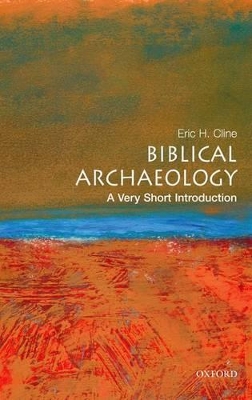Very Short Introductions
2 total works
Homer's tale of the abduction of Helen to Troy and the ten-year war to bring her back to Greece has fascinated mankind for centuries since he related it in The Iliad and The Odyssey. More recently, it has given rise to countless scholarly articles and books, extensive archaeological excavations, epic movies, television documentaries, stage plays, art and sculpture, even souvenirs and collectibles. However, while the ancients themselves thought that
the Trojan War took place and was a pivotal event in world history, scholars during the Middle Ages and into the modern era derided it as a piece of fiction.
This book investigates two major questions: did the Trojan War take place and, if so, where? It ultimately demonstrates that a war or wars in the vicinity of Troy probably did take place in some way, shape, or form during the Late Bronze Age, thereby forming the nucleus of the story that was handed down orally for centuries until put into essentially final form by Homer. However, Cline suggests that although a Trojan War (or wars) probably did take place, it was not fought because of Helen's
abduction; there were far more compelling economic and political motives for conflict more than 3,000 years ago.
Aside from Homer, the book examines various classical literary sources: the Epic Cycle, a saga found at the Hittite capital of Hattusas, treatments of the story by the playwrights of classical Greece, and alternative versions or continuations of the saga such as Virgil's Aeneid, which add detail but frequently contradict the original story. Cline also surveys archaeological attempts to document the Trojan War through excavations at Hissarlik, Turkey, especially the work of
Heinrich Schliemann and his successors Wilhelm Dörpfeld, Carl Blegen, and Manfred Korfmann.
ABOUT THE SERIES: The Very Short Introductions series from Oxford University Press contains hundreds of titles in almost every subject area. These pocket-sized books are the perfect way to get ahead in a new subject quickly. Our expert authors combine facts, analysis, perspective, new ideas, and enthusiasm to make interesting and challenging topics highly readable.
the Trojan War took place and was a pivotal event in world history, scholars during the Middle Ages and into the modern era derided it as a piece of fiction.
This book investigates two major questions: did the Trojan War take place and, if so, where? It ultimately demonstrates that a war or wars in the vicinity of Troy probably did take place in some way, shape, or form during the Late Bronze Age, thereby forming the nucleus of the story that was handed down orally for centuries until put into essentially final form by Homer. However, Cline suggests that although a Trojan War (or wars) probably did take place, it was not fought because of Helen's
abduction; there were far more compelling economic and political motives for conflict more than 3,000 years ago.
Aside from Homer, the book examines various classical literary sources: the Epic Cycle, a saga found at the Hittite capital of Hattusas, treatments of the story by the playwrights of classical Greece, and alternative versions or continuations of the saga such as Virgil's Aeneid, which add detail but frequently contradict the original story. Cline also surveys archaeological attempts to document the Trojan War through excavations at Hissarlik, Turkey, especially the work of
Heinrich Schliemann and his successors Wilhelm Dörpfeld, Carl Blegen, and Manfred Korfmann.
ABOUT THE SERIES: The Very Short Introductions series from Oxford University Press contains hundreds of titles in almost every subject area. These pocket-sized books are the perfect way to get ahead in a new subject quickly. Our expert authors combine facts, analysis, perspective, new ideas, and enthusiasm to make interesting and challenging topics highly readable.
Public interest in biblical archaeology is at an all-time high, as television documentaries pull in millions of viewers to watch shows on the Exodus, the Ark of the Covenant, and the so-called Lost Tomb of Jesus. Important discoveries with relevance to the Bible are made virtually every year--during 2007 and 2008 alone researchers announced at least seven major discoveries in Israel, five of them in or near Jerusalem. Biblical Archaeology offers a passport into this fascinating realm, where ancient religion and modern science meet, and where tomorrow's discovery may answer a riddle that has lasted a thousand years.
Archaeologist Eric H. Cline here offers a complete overview of this exciting field. He discusses the early pioneers, such as Sir William Matthew Flinders Petrie and William Foxwell Albright, the origins of biblical archaeology as a discipline, and the major controversies that first prompted explorers to go in search of objects and sites that would "prove" the Bible. He then surveys some of the most well-known biblical archaeologists, including Kathleen Kenyon and Yigael Yadin, the sites that are essential sources of knowledge for biblical archaeology, such as Hazor, Megiddo, Gezer, Lachish, Masada, and Jerusalem, and some of the most important discoveries that have been made, including the Dead Sea Scrolls, the Mesha Inscription, and the Tel Dan Stele. Subsequent chapters examine additional archaeological finds that shed further light on the Hebrew Bible and New Testament, the issue of potential frauds and forgeries, including the James Ossuary and the Jehoash Tablet, and future prospects of the field.
Biblical Archaeology: A Very Short Introduction captures the sense of excitement and importance that surrounds not only the past history of the field but also the present and the future, with fascinating new discoveries made each and every season.
ABOUT THE SERIES: The Very Short Introductions series from Oxford University Press contains hundreds of titles in almost every subject area. These pocket-sized books are the perfect way to get ahead in a new subject quickly. Our expert authors combine facts, analysis, perspective, new ideas, and enthusiasm to make interesting and challenging topics highly readable.
Archaeologist Eric H. Cline here offers a complete overview of this exciting field. He discusses the early pioneers, such as Sir William Matthew Flinders Petrie and William Foxwell Albright, the origins of biblical archaeology as a discipline, and the major controversies that first prompted explorers to go in search of objects and sites that would "prove" the Bible. He then surveys some of the most well-known biblical archaeologists, including Kathleen Kenyon and Yigael Yadin, the sites that are essential sources of knowledge for biblical archaeology, such as Hazor, Megiddo, Gezer, Lachish, Masada, and Jerusalem, and some of the most important discoveries that have been made, including the Dead Sea Scrolls, the Mesha Inscription, and the Tel Dan Stele. Subsequent chapters examine additional archaeological finds that shed further light on the Hebrew Bible and New Testament, the issue of potential frauds and forgeries, including the James Ossuary and the Jehoash Tablet, and future prospects of the field.
Biblical Archaeology: A Very Short Introduction captures the sense of excitement and importance that surrounds not only the past history of the field but also the present and the future, with fascinating new discoveries made each and every season.
ABOUT THE SERIES: The Very Short Introductions series from Oxford University Press contains hundreds of titles in almost every subject area. These pocket-sized books are the perfect way to get ahead in a new subject quickly. Our expert authors combine facts, analysis, perspective, new ideas, and enthusiasm to make interesting and challenging topics highly readable.

